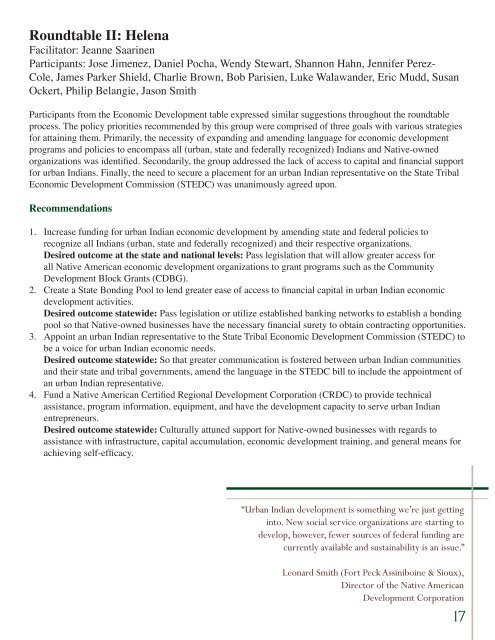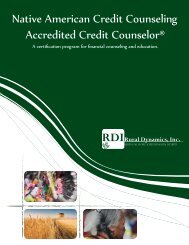Urban Indian Policy Roundtable - Rural Dynamics
Urban Indian Policy Roundtable - Rural Dynamics
Urban Indian Policy Roundtable - Rural Dynamics
Create successful ePaper yourself
Turn your PDF publications into a flip-book with our unique Google optimized e-Paper software.
<strong>Roundtable</strong> II: Helena<br />
Facilitator: Jeanne Saarinen<br />
Participants: Jose Jimenez, Daniel Pocha, Wendy Stewart, Shannon Hahn, Jennifer Perez-<br />
Cole, James Parker Shield, Charlie Brown, Bob Parisien, Luke Walawander, Eric Mudd, Susan<br />
Ockert, Philip Belangie, Jason Smith<br />
Participants from the Economic Development table expressed similar suggestions throughout the roundtable<br />
process. The policy priorities recommended by this group were comprised of three goals with various strategies<br />
for attaining them. Primarily, the necessity of expanding and amending language for economic development<br />
programs and policies to encompass all (urban, state and federally recognized) <strong>Indian</strong>s and Native-owned<br />
organizations was identified. Secondarily, the group addressed the lack of access to capital and financial support<br />
for urban <strong>Indian</strong>s. Finally, the need to secure a placement for an urban <strong>Indian</strong> representative on the State Tribal<br />
Economic Development Commission (STEDC) was unanimously agreed upon.<br />
Recommendations<br />
1.<br />
2.<br />
3.<br />
4.<br />
Increase funding for urban <strong>Indian</strong> economic development by amending state and federal policies to<br />
recognize all <strong>Indian</strong>s (urban, state and federally recognized) and their respective organizations.<br />
Desired outcome at the state and national levels: Pass legislation that will allow greater access for<br />
all Native American economic development organizations to grant programs such as the Community<br />
Development Block Grants (CDBG).<br />
Create a State Bonding Pool to lend greater ease of access to financial capital in urban <strong>Indian</strong> economic<br />
development activities.<br />
Desired outcome statewide: Pass legislation or utilize established banking networks to establish a bonding<br />
pool so that Native-owned businesses have the necessary financial surety to obtain contracting opportunities.<br />
Appoint an urban <strong>Indian</strong> representative to the State Tribal Economic Development Commission (STEDC) to<br />
be a voice for urban <strong>Indian</strong> economic needs.<br />
Desired outcome statewide: So that greater communication is fostered between urban <strong>Indian</strong> communities<br />
and their state and tribal governments, amend the language in the STEDC bill to include the appointment of<br />
an urban <strong>Indian</strong> representative.<br />
Fund a Native American Certified Regional Development Corporation (CRDC) to provide technical<br />
assistance, program information, equipment, and have the development capacity to serve urban <strong>Indian</strong><br />
entrepreneurs.<br />
Desired outcome statewide: Culturally attuned support for Native-owned businesses with regards to<br />
assistance with infrastructure, capital accumulation, economic development training, and general means for<br />
achieving self-efficacy.<br />
“<strong>Urban</strong> <strong>Indian</strong> development is something we’re just getting<br />
into. New social service organizations are starting to<br />
develop, however, fewer sources of federal funding are<br />
currently available and sustainability is an issue.”<br />
Leonard Smith (Fort Peck Assiniboine & Sioux),<br />
Director of the Native American<br />
Development Corporation<br />
17



